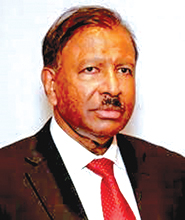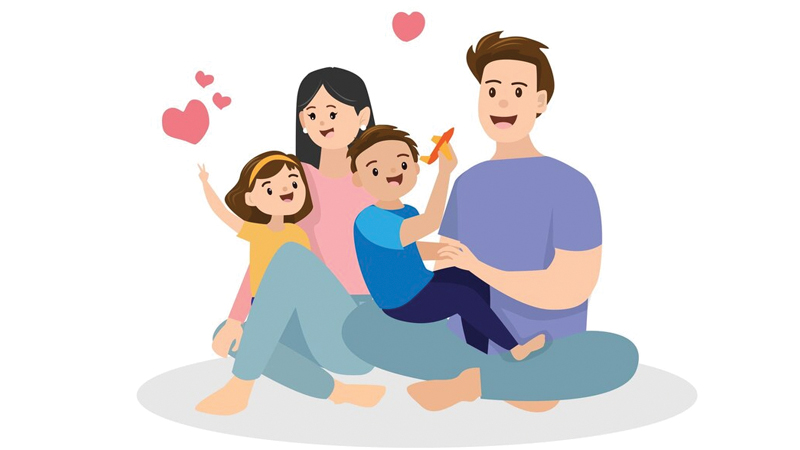In two days we will be observing World Mental Health Day. In recent announcements in the media, Health officials have warned of a surge in mental illness among Sri Lankans in recent years with one in four persons being afflicted with a mental problem according to the Dept of Census and Statistics.

Dr. Jayan Mendis
The plus point is that compared to two decades ago and due to more awareness raising by the Health Ministry, more people with mental health disorders are now seeking medical help more frequently than few decades ago thus making use of the opportunities of the vastly improved mental health facilities that are now available to help them cope better with the fresh challenges they face with the ongoing economic crisis, food and fuel shortages, high living costs and shortages of medicines. All these have collectively added to their stress levels in general and while a few manage to cope, the majority fail due to the stigma that still surrounds mental ill health which prevents them from seeking medication and therapeutic counselling early- delays that ultimately lead to loss of self worth and social isolation from the community they live in.
The Sunday Observer spoke to one of the most experienced and eminent psychiatrists in the country, Senior Consultant Psychiatrist and former Director of the National Institute of Mental Health (NIMH), Dr. Jayan Mendis to get a hands on insight into these new challenges faced by persons with mental conditions, and advise parents of their important role in helping their children to enjoy a carefree, secure childhood which is their right.
Excerpts
Q: The theme of 2023’s World Mental Health Day, set by the World Federation for Mental Health (WFMH) is ‘Mental health is a universal human right.’ How relevant is this theme in today’s society where mental illness is now at unacceptable levels with the vast majority of affected persons often sidelined, ignored and considered outcasts of society?
A. Today, the society is very complex and when the society is complex your mental health tends to deteriorate, making it difficult for the person concerned to cope with difficult situations or even normal day to day activities. Up lifting them and supporting them is their right – a right which has been endorsed in our constitution.
Q: Which categories of society need such support?
A. Generally, the high-risk groups in any country are children, young adults, pregnant mothers, postmenopausal age group females, the elderly and those who undergo strenuous life events. Regarding women and the elderly population (those above 65 years), during pregnancy a percentage of women undergo various psychological disorders including postnatal depression while a small percentage may get postnatal psychosis. Following menopause females are more prone to psychological dysfunction due to the hormonal change which associates with depression and stress related disorders. In the case of the elderly population, they are vulnerable to mental ill health due to various changes in the brain, and the fact that they have to face various life event changes, such as social isolation, loss of their jobs and position and retirement.
Q: You also mentioned young adults, age-wise and gender-wise, how early in life does an adolescent become vulnerable to developing a mental condition and why?
A. Adolescents and young adults are more prone to severe mental illnesses as well as minor mental illnesses such as stress disorders, OCD, social phobias and anxiety. During pregnancy a percentage of ladies undergo various psychological dysfunctions including postnatal depression while a small percentage may get postnatal psychosis.
Q: What are the factors that trigger a mental condition in general?
 A. Mental diseases happen when a person is unable to balance his incoming pressures and the delivery of his/her actions. People with certain personalities have more tendencies to develop mental diseases than others. For example, someone with an anxious personality or paranoid personality have a higher tendency to develop mental disorders.
A. Mental diseases happen when a person is unable to balance his incoming pressures and the delivery of his/her actions. People with certain personalities have more tendencies to develop mental diseases than others. For example, someone with an anxious personality or paranoid personality have a higher tendency to develop mental disorders.
Q: What are the commonest mental illnesses worldwide?
A. Anxiety disorders and depressive disorders are the commonest mental illnesses worldwide. Comparatively the main mental health disorders like Bipolar Disorder (40 million) and Schizophrenia (24 million) are less common worldwide.
Q: Depression has been cited as a very common mental illness. Do you agree?
A. Yes, depressive disorders are common in Sri Lanka. Unfortunately, there are no proper studies done in the recent past to determine the prevalence and incidence of common mental disorders in Sri Lanka.
Q: Are panic attacks a mental disorder?
A. Yes. A panic attack is a form of severe anxiety. The dominant symptoms differ from person to person with sudden onset of palpitations, chest pain, choking sensations, dizziness and feelings of unreality being common. Almost all complain of a fear of dying, losing control and feeling of going mad. These attacks generally last for a few minutes.
Q: Stress caused by ambitious parents wanting their child to shine academically and in extra-curricular activities has been cited as a leading causative factor for mental illness especially in children and adolescents? What is your take on this?
A. I agree. All these stressors are some of the mental challenges that are faced by children and adolescents and can lead to mental health disorders especially when they are unable to meet the expectations of their parents.
Q: The ongoing economic crisis and uncertainty of the future in Sri Lanka. In your experience in treating patients, have you seen any signs and symptoms on the mental health of the patients you treat which have been caused by these factors?
A. It has been observed in countries like Greece and other European countries affected by the Great recession that the incidence of mental health disorders increased following the economic crisis – especially mental health disorders like Depressive and Stress related Disorders. Even in Sri Lanka in practising psychiatry we have noticed a marked increase in the incidence of stress related disorder and depressive disorders as well as more and more patients presenting to the clinic with symptoms characteristic of these disorders. Unfortunately, due to various barriers these patients have difficulty in seeking therapy
Q: What are the early symptoms/signs that a parent /teacher should look out for in 1) a child?2) adolescent?
A.
 1) Any change in behavior, suddenly becoming fearful, fussy or irritable. A change in the ability to concentrate, deterioration in classroom activities and academic performance, changes in the relationship with friends may be even passing urine on bed at sleep.
1) Any change in behavior, suddenly becoming fearful, fussy or irritable. A change in the ability to concentrate, deterioration in classroom activities and academic performance, changes in the relationship with friends may be even passing urine on bed at sleep.
2) Behavioural changes like irritability, anger, sudden outburst, inability to keep up with day-to-day activities, inability to concentrate, smoking, alcohol and drugs are all early manifestations of a psychiatric disorder. Deterioration of school performances are also very characteristic in the case of adolescence.
Q: Can a drug addict end up with a mental illness? A US study say there is growing evidence that marijuana use is linked to depression, bipolar disorder, and schizophrenia. Do you agree?
A. Yes of course.
Q: A study found that the mental health well-being of adolescents in Sri Lanka was adversely affected by the Easter Sunday attack in 2019. Do you have an opinion on this?
A. More than the Easter Sunday attack which happened to a defined population (definitely that population had a significant psychological burden), Covid-19 pandemic has resulted in an increase as well as emergence of new psychological problems.
Studies have confirmed that during this time most of the population, especially adolescents, had experienced various kinds of psychological problems due to the isolation from the community and the virtual lives that became the new normal resulting in addiction to mobiles, apps and computer games.
Q: What is the usual procedure followed in evaluating a mental condition?
A. The main evaluation is through history taking and mental state examination. Thereafter, depending on the findings and presentation of the patient we decide whether to admit the patient or treat the patient in the community. We would like more and more families to get involved in the management of the patient as this leads to less patients getting admitted to the hospital. However, if the patients’ behaviour is very aggressive and presents with severe psychiatric symptoms we might have to admit the patient.
In treatment we initially try explaining the symptoms to the patient and employing psychological therapy. Oral medications are used as an adjunct or following the failure of psychological therapy. Injections might have to be given.
Q: If treated can he/she be cured?
A. Of course yes. Majority of patients presenting with various psychological disturbances overcome their psychiatric disability to a 100 percent. But a minority of patients can go into a prolonged disable situation.
Q: How can one prevent mental illness? What are the Do’s and Don’ts?
A. Mental illnesses are multifactorial. It’s a combination of biological, psychological and social factors interacting with each other. Biological factors- genetic predisposition, medication, substance use, physical illnesses like infections, trauma, endocrine disorders
Psychological factors – personality, relationship difficulties
Social factors – stressful events, loss, change in role, life changing events
So in terms of prevention
Dont’s – consume alcohol and other substances.
Do’s – Talk about your feelings, get a good night’s sleep, eat well, stay active, practise mindfulness, keep in touch with friends and family, Care for others.
Q: Gaps you wish to fill in delivering optimal care for mentally ill patients to help them lead quality lives.
A. There has to be more and more mental health workforce required essentially to fill the gaps of providing services to people in the community near to their patients’ home.
Q: Your message to all young people out there on protecting themselves from the risks of mental illness?
A. The moment you see or feel a psychological disturbance happening to you immediately seek therapy and advice from a specialist in the field of mental health. Consuming drugs, alcohol, postponing coming for treatment will definitely complicate and delay the recovery.
Q: The theme of this year’s World Children’s Day which fell on October 1 was “Children before everything”. In their message both the President and the Prime Minister of Sri Lanka has reiterated that the importance of providing the requisite services, facilities as well as creating opportunities for your child within a secure environment, from a psychiatrist’s point of view how relevant is this theme in a country where the number of children with psychiatric and psychological problems is rising daily due to various factors?
A. The well trained mental health work force is required at the grass root level in each and every district in Sri Lanka.
If we are aiming the properly trained mental health workforce, those targets could be achieved without any problem. Both the President and the Prime Minister may have been having ideas to improve mental health work force definitely to achieve this dream.









